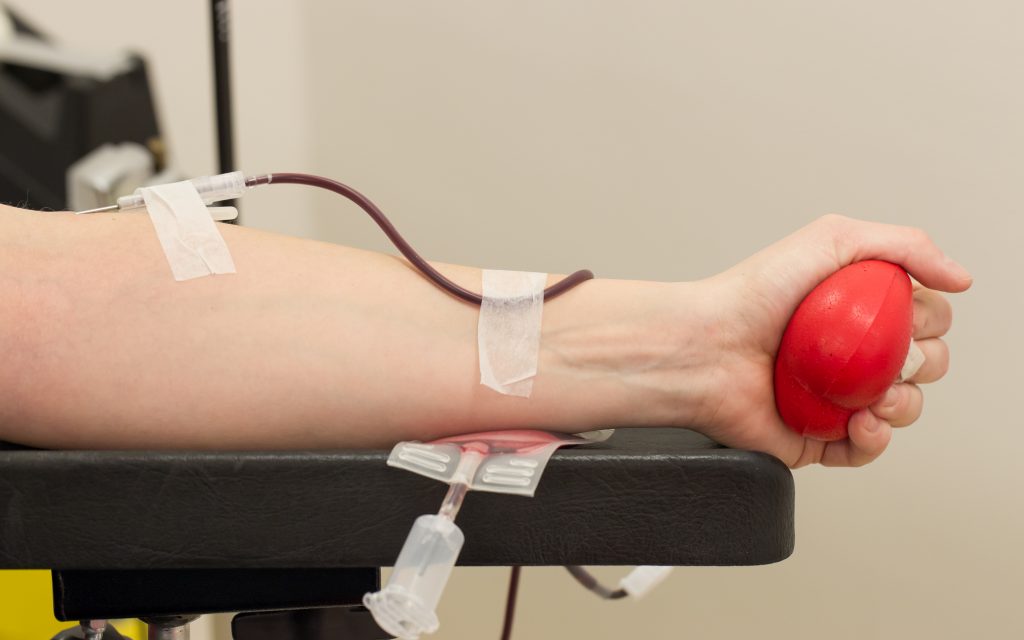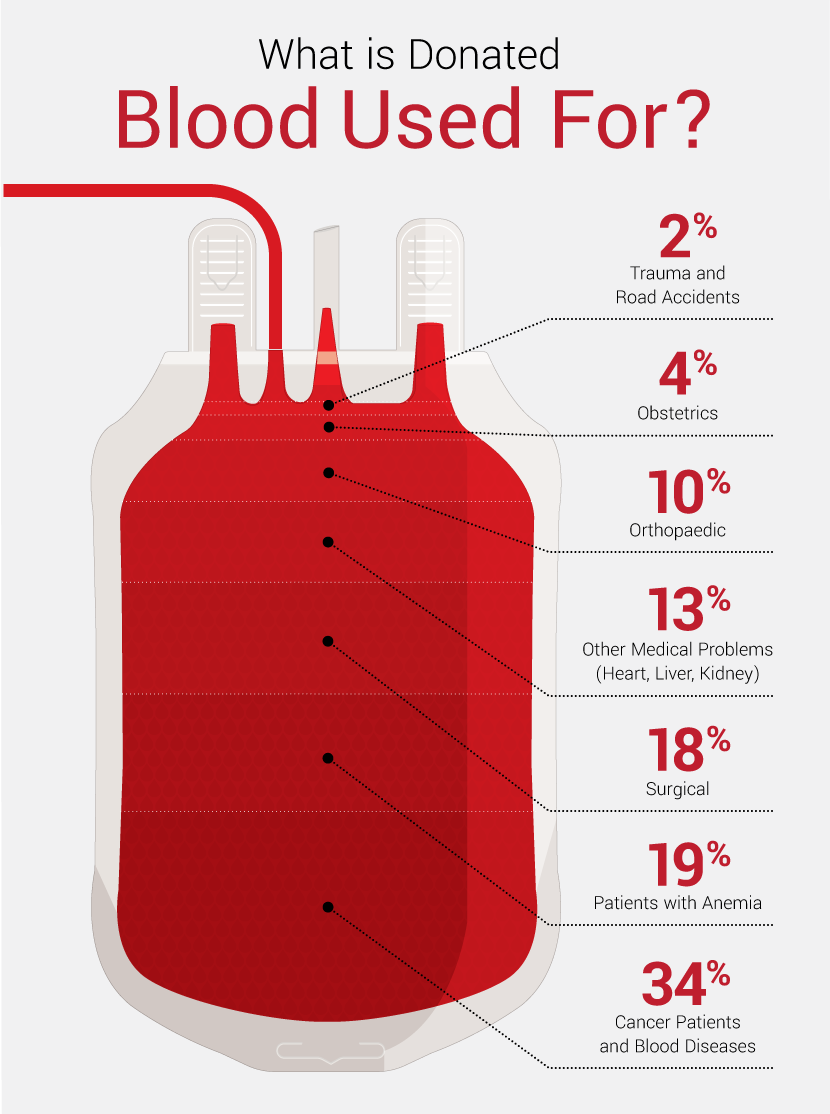What to eat before donating blood and what to avoid?
Every day try to eat three portions of food listed below that are good sources of iron: breakfast cereals - some cereals are fortified with iron. pulses and beans - in particular baked beans, chickpeas and lentils. nuts (including peanut butter) brown rice. tofu. bread - especially wholemeal or ...
What to do before donating blood?
Avoid alcohol for 24 hours. Avoid lifting heavy items and rigorous exercise for the remainder of the day. What is my donated blood tested for? After donating a sample of your blood will be sent to our state-of-the-art testing facility. Your blood type will be determined and multiple tests will be performed to ensure your blood is safe for transfusion.
Can you work out after giving blood?
Additional tips for after your donation: Keep the strip bandage on for the next several hours; to avoid a skin rash, clean the area around the bandage with soap... Don’t do any heavy lifting or vigorous exercise for the rest of the day. If the needle site starts to …
What to do before giving blood?
Aug 09, 2019 · To minimize any adverse reactions, it is important to prepare for your blood donation by eating an iron-rich meal and drinking plenty of fluids. You will also want to replace fluids immediately after donating, and to keep the body well-nourished. As levels return to normal, any discomfort subsides. Long-term benefits to your body when you donate blood

What should I do after donating blood?
After your blood donation:Drink extra fluids.Avoid strenuous physical activity or heavy lifting for about five hours.If you feel lightheaded, lie down with your feet up until the feeling passes.Keep your bandage on and dry for the next five hours.More items...•Mar 4, 2021
What should I not do after donating blood?
Do: Avoid Alcohol We advise donors to stay away from alcohol until they have fully recovered from their donation. It can be very easy to feel the effects of alcohol after donating because there is less blood to dilute the alcohol in your system.
How long does it take to recover from donating blood?
How long will it take to replenish the pint of blood I donate? Your body will replace the blood volume (plasma) within 48 hours. It will take four to eight weeks for your body to completely replace the red blood cells you donated.
Do you need to rest after donating blood?
Heed the Red Cross's advice to give yourself 24 hours rest afterward to allow your plasma levels to restore, and hydrate and fuel well before and after your donation (1).
Can I take a hot bath after donating blood?
eat and drink – you will be encouraged to have at least 2 drinks and a snack before you leave. avoid using the donation arm to carry anything very heavy for the rest of the day. avoid having a hot bath after you have given blood.
Does giving blood make you tired?
Fatigue. Slight fatigue is normal after a blood donation, and some people experience this more than others. Anyone who feels tired after donating blood should rest until they feel better. Drinking plenty of water and restoring vitamin and mineral levels may help reduce fatigue.
Can I drink coffee after donating blood?
At the end of your donation, you will be given fluids to help replace the plasma. Drink plenty of fluids the day of, such as water or juice and have a healthy breakfast. Avoid drinks such as coffee, tea or alcohol as they can dehydrate you.
What are the side effects of giving blood?
The side effects of donating blood include nausea and dizziness and fainting in some cases. You may develop a raised bump or experience continued bleeding and bruising at the needle site too. Some people might experience pain and physical weakness after donating blood.
Which juice is good after blood donation?
“Have foods rich in folic acid," she says. “Your body uses folic acid, also known as B-9, to manufacture new red blood cells to help replace blood cells lost during donation." Folic acid-rich foods include liver, dried beans, asparagus, green leafy vegetables like spinach, orange juice, and fortified breads.Jun 17, 2013
How many calories do you burn donating blood?
650 caloriesBut when you donate regularly, it gives you the opportunity to save multiple lives. Burning calories. No, blood donation won't become a weight loss fad any time soon. However, researchers at the University of California, San Diego have found that you can lose up to 650 calories per pint of blood donated.Jun 11, 2018
Can I drink coffee before donating blood?
Donors should have a healthy meal and drink fluids within four hours before donating. It is best to avoid coffee and caffeinated beverages before donating.
Can you get a headache after giving blood?
If you become ill with 2 or more of the following symptoms in the next 14 days, please call us as soon as possible: Flu-like symptoms (headache, eye pain, muscle and/or joint aches or weakness, rash, swollen glands) Bleeding or easy bruising (unrelated to your blood donation)
Before Your Donation
Select a donation type and find a convenient time that works best for you.
On the Day of Your Donation
To expedite your donation, start your RapidPass® on the day of your appointment.
After Your Donation
Relax for a few minutes in our refreshment & recovery area — have some cookies or other snacks — you’ve earned it!
How to prepare for blood donation?
To minimize any adverse reactions, it is important to prepare for your blood donation by eating an iron-rich meal and drinking plenty of fluids. You will also want to replace fluids immediately after donating, and to keep the body well-nourished. As levels return to normal, any discomfort subsides. Long-term benefits to your body ...
Why do people donate blood?
This may be partly because donating blood helps blood flow, giving it a lower viscosity (resistance) and thus making it less damaging to blood vessels. There are other ways that donating blood impacts your heart as well. Blood donation also helps regulate iron levels in the body.
What is blood donation?
Blood donation is a lifesaving gift and a beneficial procedure, for both recipient and donor. What happens to your body when you donate blood?
Why is blood donation important?
Blood donation also helps regulate iron levels in the body. Too much iron can be damaging to blood vessels, and a regular decrease of iron-rich blood and subsequent replenishment due to blood donation can lead to a more beneficial lower iron level. Men tend to store more iron in their bodies than women, which is why iron deficiency is rare in men.
Who is Paul Ramey?
Paul Ramey is a OneBlood Graphic Designer, as well as a published author ( Edgar Wilde and the Lost Grimoire) and music recording artist ( Nothing On Earth ). Paul is very proud to be part of OneBlood’s lifesaving team.
Is blood donation good for you?
Long-term benefits to your body when you donate blood. Studies reveal many possible benefits of regular blood donation. According to the American Journal of Epidemiology, 88% of blood donors are less likely to suffer a heart attack.
How long after blood donation can you drink?
There aren’t any lasting side effects, but you may temporarily: Need to hydrate. Drink more non-alcoholic beverages for 24-48 hours after you donate blood.
How long does it take to donate blood?
Donation. Refreshments. While the whole process, from the time you get to the facility to the time you leave, can take about an hour, the actual donation itself may take as little as 8-10 minutes.
Why do people donate blood?
There are also potential benefits for people who regularly donate blood: Lower iron levels in blood. This is a plus if your iron levels are too high. Donating blood removes some red blood cells, which carry iron throughout your body. Better cholesterol and triglyceride levels.
Can you donate blood to a tattoo?
Tattoos, in most states, aren’t a barrier to giving blood, provided that the tattoo artist followed good safety practices (like using sterile needles and not reusing ink). A few states may require a waiting period between when you get a tattoo and when you donate blood, but in general, it’s not an issue. 3. Donation.
What to do after donating blood?
Foods rich in vitamin C, such as strawberries, can help your body absorb iron after donating blood. When you donate blood, you literally give a gift that saves lives. Whether you do it out of a sense of moral duty or for the warm glow you get when you help others, never neglect your body's need to refuel. The right food and proper hydration can ...
How to donate blood safely?
Blood donation is very safe, but you'll want to make sure you don't do something that's going to compromise your health and safety. The Red Cross recommends that you: 1 Avoid alcohol for 24 hours. 2 Skip the heavy lifting and vigorous exercise during that time period. 3 Don't put yourself in positions (like climbing ladders) where fainting might lead to injury.
What to eat after blood work?
A meal of roasted beef with potatoes and broccoli provides the right combination of nutrients your body needs after giving blood. Skin-on potatoes and beef supply iron while the vitamin C in broccoli helps increase your iron absorption, Yeung says.
What to expect after blood donation?
Immediately after your donation, expect to be offered a snack. In fact, if you're a frequent blood donor, you might wonder why donation centers dole out cookies, chips, crackers and such. It's nice to treat yourself for doing good, but there's more to it than that.
What to eat to get iron?
If you don't eat animal protein, you can still bump up your iron intake through non-heme, plant-based sources, such as: Leafy greens. Beans. Legumes. Tofu. Nuts. Raisins. Pairing iron-rich foods with vitamin C helps your body absorb iron. That's especially important if you rely on plant proteins, Yeung says.

Popular Posts:
- 1. where can you donate a testicle for $35 000
- 2. where to donate old cell phones 2020
- 3. where can i donate books
- 4. who can i donate my furniture to
- 5. where to donate stuffed animals in ct
- 6. when you donate blood do they test for herpes
- 7. what is the best amount to donate for brinker family fund request form
- 8. where can i donate used children's toys
- 9. where can i donate furniture in chicago
- 10. where to donate kids shoes